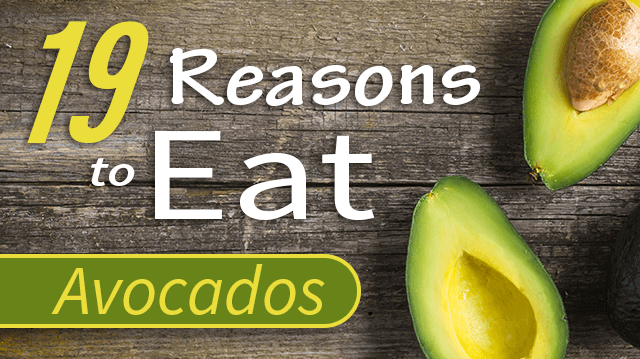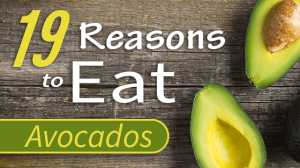
Avocados may be one of nature’s most delicious superfoods. They are used in a number of dishes around the world, and for good reason. Avocados boast a number of vitamins and minerals essential for human growth and long-term health. Avocados have the good fat you need — monounsaturated fat — which is easily burned for energy. Monounsaturated fats are also excellent glycemic controllers, which is beneficial to diabetes patients.
A 1994 study published in Diabetes Care found, “Partial replacement of complex digestible carbohydrates with monounsaturated fatty acids (avocado as one of its main sources) in the diet of patients with non-insulin-dependent diabetes mellitus improves the lipid profile favorably, maintains an adequate glycemic control, and offers a good management alternative.”
Along with the good fats, avocados are rich in pantothenic acid, fiber, vitamin K, vitamin C, potassium, folate, and the list goes on and on. Eating avocados has also been found to improve cardiovascular function, digestion, and help decrease your chance for metabolic syndrome.
This little green bundle of nutrient power can keep you healthy and happy for years. Let’s get to the core of why avocados are not only delicious, but an important part of your healthy diet.
19 absolutely undeniable healthy reasons to eat avocados
Avocados contain the healthy good stuff. Avocados are nutrient-rich and boast a number of essential vitamins and minerals needed to keep your health in tip-top shape. The following are just a few of the essential nutrients contained in a mere 100 grams of avocado.
- Pantothenic acid: 42%
- Fiber: 40%
- Vitamin K: 35%
- Copper: 31%
- Folate: 30%
- Potassium: 21%
- Vitamin C: 20%
These high levels of vitamins and minerals in avocados will help to prevent and decrease your chances from disease and illness. Pantothenic acid lowers your cholesterol, a high fiber diet decreases your risk for colon and breast cancer, and potassium will lower your blood pressure and reduce your risk for stroke.
Avocados contain more potassium than bananas. Yes, really! Bananas provide only 12 percent of your potassium daily value (DV), in comparison to the 21 percent you get from enjoying a delicious avocado.
Avocados have a very low amount of sugar. Even though the avocado is a fruit, it has just under 1 gram of sugar per cup. This is a huge difference when comparing other fruits, which normally contain higher amounts of sugar.
Avocados are a wonderful source of protein. Protein is an essential part of our diet. Your body is comprised of approximately 10,000 different proteins according to the Harvard School of Public Health. Avocados will boost your protein levels by 3 grams per cup.
What’s for dinner? Avocados go with almost any dish!
Avocados will lower your risk for metabolic syndrome. A study published in the Nutrition Journal (2013) discusses the nutritional impact avocados have on developing and managing metabolic syndrome. The study found, “Avocado consumption is associated with improved overall diet quality, nutrient intake, and reduced risk of metabolic syndrome.”
They keep your cholesterol levels balanced. The pantothenic acid in avocados plays an important role in maintaining healthy cholesterol parameters.
Avocados will lower your risk for coronary heart disease (CHD). Heart disease is a global killer; it’s the leading cause of death in American men and women. According to the Centers for Disease Control and Prevention (CDC), 25 percent of the population will die from heart disease annually. Avocados can lower your risk of developing high cholesterol, which is a leading factor in CHD.
Adding avocados to other vegetables can increase antioxidant absorption. A 2005 study published in The Journal of Nutrition found that adding avocados to your salad would increase your carotenoid absorption. The study states, “We observed a notable increase in the absorption of carotenoids from vegetable-based foods consumed with avocados.”
Great for pregnant women. They are excellent sources of healthy fat and protein for pregnant women.
There are a myriad of ways to prepare avocados: You can use avocado to substitute butter; avocados are the main ingredient in guacamole; they make great dessert toppers; or you can just eat them plain. The possibilities are truly endless.
Avocados offer excellent protection for your eyes. They are like green, polarized sunglasses you can consume. A study involving 58 pairs of human retinas and 1 set of monkey retinas — no, this is not a joke — were studied in relation to lutein and zeaxanthin oxidation, two important nutrients for healthy eyes.
The study found, “The proposed oxidative-reductive pathways for lutein and zeaxanthin in human retina, may therefore play an important role in prevention of age-related macular degeneration and cataracts.” One ounce of avocado contains 81 micrograms of lutein.
 Avocados can help you keep those extra pounds off. A 2013 study published in Nutrition Journal examined the hunger patterns of 26 adults for five hours after eating an avocado. The study revealed that 23 percent of the subjects felt full and 28 percent had little need to eat over the five-hour testing period.
Avocados can help you keep those extra pounds off. A 2013 study published in Nutrition Journal examined the hunger patterns of 26 adults for five hours after eating an avocado. The study revealed that 23 percent of the subjects felt full and 28 percent had little need to eat over the five-hour testing period.
They boost immune health. The high amount of vitamin C in avocados, 20 percent of your DV per 100 grams, can help keep your immune system functioning in the optimal range. Vitamin C also lowers your risk for the common cold, allergies, musculoskeletal injury and hypertension.
Avocados may keep your colon and rectum cancer free. Avocados contain high amounts of folate per cup, and folate has been found to prevent colon and rectal cancer. A 2007 study published in The Journal of the American Medical Association states, “A large number of epidemiological studies have shown that a higher intake of folate, as well as higher intakes of vegetables and fruit, is associated with a decreased risk of colorectal polyps and cancer.
Avocados can lower your blood pressure. The nutrients packed into these little green fruits can help lower your risk of hypertension.
Avocados keep you regular. 100 grams of avocado contains 40 percent of your fiber DV. Fiber will alleviate bowel issues and keep things moving.
Stuck at your desk and hungry? What do you reach for, candy bar or avocado? By now, I am hoping you choose the avocado. They are a delicious snack you can easily devour to ease the hunger pangs before lunch. Avocados are also a great garnish to morning eggs!
Avocados are always in season and can be implemented into any diet. The versatility and availability of avocados makes them an accessible fruit you can enjoy all year!
Are you ready for the avocado challenge? Add an avocado to your daily regimen for one month and see how you feel. You may even be weeding out grain-based carbohydrates from your diet, and avocados can help you with maintaining a healthy fat intake to supplement less carbs.
The health benefits of eating avocados are undeniable, and this little green superfood can keep your risk for disease low, while offering up more energy and better overall well-being.
– Stephen Seifert
Stephen Seifert is a writer, professor, adventurer and a health & fitness guru. His flare for travel and outdoor adventure allows him to enjoy culture and traditions different than his own. A healthy diet, routine fitness and constant mental development is the cornerstone to Stephen’s life.
Sources:
http://care.diabetesjournals.org/content/17/4/311.short
http://advances.nutrition.org/content/3/4/506.short
http://www.hsph.harvard.edu/nutritionsource/what-should-you-eat/protein
http://www.biomedcentral.com/content/pdf/1475-2891-12-1.pdf
http://www.cdc.gov/dhdsp/data_statistics/fact_sheets/fs_heart_disease.htm
http://jn.nutrition.org/content/135/3/431.full
http://iovs.arvojournals.org/article.aspx?articleid=2180938
http://www.nutritionj.com/content/12/1/155
http://www.whfoods.com/genpage.php?tname=nutrientprofile&dbid=100
http://jama.jamanetwork.com/article.aspx?articleid=207300

